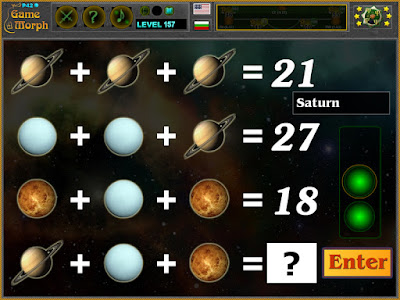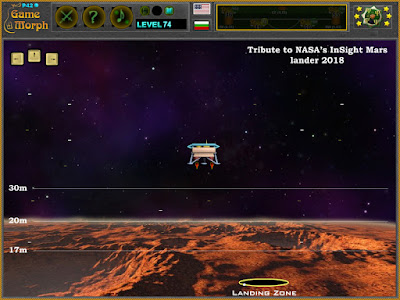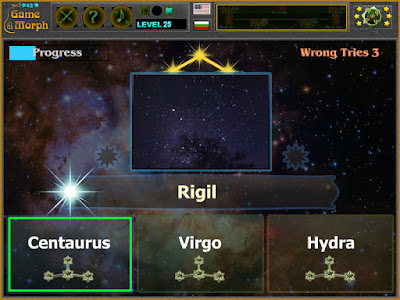The "Planet Structures Puzzle" is a small knowledge level game to place the internal structures on the correct planet. Fun educational game to study the interior structures of the planets in the Solar System. Astronomy learning game, suitable for online lessons and interactive classes. Free online game. Fun astronomy class for desktop computers, laptops and tablets, which may be played in the web browser. Interactive lesson for 10 grade. The game is part of the Interactive Astronomy Observatory educational tools.
Free online games for education, knowledge and science. Electronic Game School is a systematised portal to one of the greatest educational web sites with fun learning games and interactive lessons.
Showing posts with label Astronomy Games. Show all posts
Showing posts with label Astronomy Games. Show all posts
Saturday 6 June 2020
Wednesday 23 October 2019
Astronomy Games
Astronomy games to explore and study the space. More than 40 online games, related to different astronomical subjects, that may be used for fun, interactive education and examination. The astronomy knowledge games are small online games, up to 1 - 1.5 MB, which include puzzles, mosaics, tile games, maze games, board games and picture tests for learning interesting facts about space, astronomy achievements and history of astronomy. A range of astronomy topics, like planets, stars, space crafts, missions, moons, notions and phenomenon, are made in a fun interactive way. The astronomy learning games are suitable tools for education, examination, references and recreation. Free online astronomy classroom for kids and students. Fun astronomy educational games, suitable for online lessons and interactive classes.
PLAY ONLINE
Wednesday 9 October 2019
The planets in the Solar System - Interactive lesson
Part 1
Part 2
In the course of the lesson we are going to sort all the planets in their correct places.
The first planet is Mercury. I will find it in the the movable objects and place it in the slot near the Sun.What is interesting to know about Mercury is that it is the closest planet to the sun.
It have the shortest year of all planets, which is equal to 88 Earth days, that is the time Mercury goes around the Sun. But its own rotation is by far very slow. It takes 58 days for Mercury to turn around itself once. In other words, one year on Mercury is almost half a day there too. This slow rotation makes another interesting event. Facing the sun for a long period, makes the planet very hot on one side, and extreme cold on the other shaded side.
The second planet is Venus. Its distance from the Sun is almost in the sweet spot, like Earth, making it suitable for life. So why there is not life there? Well, may be Venus did have life, but it was destroyed due to a runaway greenhouse effect.
What is most bizarre about Venus, is that it is the only planet in the Solar System, to rotates clockwise. The reason for this may by a hit by another space object, which have changed its rotation. Venus also have the longest day of all planets - 243 Earth days.
The third planet is the Earth, our home planet. Its distance from the Sun, not very hot, not very cold, the available water, and the iron core magnetic field(the shield against Sun radiation), makes it a perfect place for carbon based live forms to thrive.
The Earth also have one natural satellite - the Moon. The moon is orbiting around with one side always facing at the Earth. So from here, we always see only one side and the other side is a secret for the Earth's telescopes.
The moon is also getting far end far from us. One day we may lost in in space.
The forth planet is Mars. It is one of the most explored planets, as its atmosphere is not very violent. Mars have 2 moons, but they are not planets, just some pieces of rocks captured in its orbit. First one is Deimos. It is probably part of the asteroid belt, detached from the hive. The other one is Phobos. If we spent one day on Mars, we will see Phobos passing through the skies 3 times.
Here goes the Asteroid Belt. It is not considered a planet and often is neglected when studying the Solar system. The asteroid belt is a living example, how a planet failed to form in its natural way. The reason is believed to be the huge gravity of Jupiter. There is one notable dwarf planet in the asteroid ring - Ceres is the largest planetoid having a real round shape.
The fifth planet is Jupiter. It is a gas giant and is the biggest planet in the Solar system. As it sounds, gas giants are mainly composed by gases. And only the core consist of rock or ice. Jupiter also play very important role for the life on Earth. With its huge gravity, it attracts space travelling objects, and do not allow them to reach other planets. Like all gas giants, Jupiter have a lot of moons. 67 objects are circling around it, and some of them are well developed planets, like Io, Europa, Ganymede and Callisto.
The sixth planet is Saturn. Another gas giant famous with its visible ring of space objects moving around it. It is 24 times bigger than Earth and have 62 natural satellites, some of them very small in size. The biggest moon is Titan, the second largest moon in the system.
The seventh planet is Uranus. A pale blue gas giant, 10 times bigger than Earth. What is most odd about Uranus, is that its axis of rotation is approximately parallel with the plane of the Solar System. In other words, it rotates around itself like top-down, and not like the rest of the planets left - right. Uranus have 27 natural satellites. The most notable one is Titania.
The eighth planet is Neptune. An ocean blue gas giant with almost the same size as Uranus. One year on Neptune is 164 Earth years. It has 14 known moons, the most notable being Triton.
And this is the point where Heliosphere ends. The rest of the planets are called trans-Neptunian objects and are at a great distance from the Sun. Also their orbits are so elliptical, that they may appear in or out of the Oort Cloud. They are caught in the Sun's orbit in a range called Interstellar Space.
The ninth planet is Pluto. It is double dwarf planet, as the latest discoveries show, that Pluto have a brother planet Charon. Pluto and Charon are considered a binary planet because the barycenter of their orbits does not lie within either body. This means that they both looks like circling each other. Pluto have another 4 natural satellites - Styx, Nix, Kerberos and Hydra.
The tenth planet, considered in this fun astronomy game is the dwarf planet Haumea. The planet has an ellipsoid shape and even have 2 moons - Hiiaka and Namaka.
The far most planet is Sedna. It is a minor dwarf planet in the outer reaches of the Solar System. Little is still confirmed about where did this planet came from, or how was formed. Some of those distant space objects may as well be satellites for some of the gas giants. It takes a lot of years to see where actually one orbit leads, as some of them need more than 100 years to complete one side cycle. For Sedna, "she" goes one time around the sun, for 12 000 years! So this planet haven't completed even one cycle, while human have evolved from iron age, to modern times.
Hope you hand fun with this exciting lesson.
Saturday 16 March 2019
Math Planets
"Math Planets" is a free online game to study and solve popular algebraic equation systems with planet pictures. Find the missing number in the last line of the combinational planets equations. Math learning game, suitable for online lessons and interactive classes. Interactive algebraic system. Fun educational math game. The Math Knowledge Board include 3 mathematical frustration puzzles with planets to solve. The game is part of the Interactive Math School educational tools. Fun math quiz for all ages. Test for the smartest.
PLAY ONLINE
Sunday 30 December 2018
Mars Lander 2019
"Mars Lander" is a free online knowledge level game dedicated to the NASA’s InSight Mars lander. Minute to win it game. Astronomy learning game, about the 4 stage of the landing mission. Fun astronomy educational game to explore and study Mars missions. Part of the Interactive Astronomical Observatory educational tools.
PLAY ONLINE
Wednesday 14 November 2018
Asteroid Defense
"Asteroid Defense" is a free online knowledge level game to defend planet Earth from falling asteroids. Minute to win it game. Astronomy learning game, suitable for online classes and interactive lessons. Fun astronomy educational game to explore and study Earth-crossing potentially hazardous objects. Part of the Interactive Astronomical Observatory educational tools.
PLAY ONLINE
Monday 12 November 2018
Cassini Maze
"Cassini Maze" is a free online knowledge level game to help the Cassini–Huygens spacecraft to flyby Saturn's ring and reach planet Titan. Astronomy learning game, suitable for online classes and interactive lessons. Fun astronomy educational game to explore and study Cassini space mission. Part of the Interactive Astronomical Observatory educational tools.
PLAY ONLINE
Saturday 10 November 2018
Area 51 Maze
"Area 51 Maze" is a free online knowledge level game to find the way to Area 51 through the labyrinth. Minute to win it game. Fun astronomy game to explore Area 51 location, myths and folklore. Part of the Interactive Astronomical Observatory educational tools.
PLAY ONLINE
Thursday 8 November 2018
Carina Nebula Puzzle
"Carina Nebula Puzzle" is a free online knowledge level game to sort the picture of the Carina Nebula. Minute to win it game. Astronomy learning game, suitable for online classes and interactive lessons. Fun astronomy educational game about а large complex area of bright and dark nebulosity in the constellation Carina. Part of the Interactive Astronomical Observatory educational tools.
PLAY ONLINE
Tuesday 6 November 2018
Eagle Nebula Puzzle
"Eagle Nebula Puzzle" is a free online knowledge level game to sort the picture of the Eagle Nebula. Minute to win it game. Astronomy learning game, suitable for online classes and interactive lessons. Fun astronomy educational game about а young open cluster of stars in the constellation Serpens. Part of the Interactive Astronomical Observatory educational tools.
PLAY ONLINE
Sunday 4 November 2018
Orion Puzzle
"Orion Puzzle" is a free online knowledge level game to sort the picture of the Orion constellation. Minute to win it game. Astronomy learning game, suitable for online classes and interactive lessons. Fun astronomy educational game about a prominent constellation located on the celestial equator. Part of the Interactive Astronomical Observatory educational tools.
PLAY ONLINE
Friday 2 November 2018
Spitzer Puzzle
"Spitzer Puzzle" is a free online knowledge level game to assemble the picture of the Spitzer infrared space telescope. Minute to win it game. Astronomy learning game, suitable for online classes and interactive lessons. Fun astronomy educational game about space exploration and observation of the cosmos. Part of the Interactive Astronomical Observatory educational tools.
PLAY ONLINE
Tuesday 30 October 2018
Hubble Puzzle
"Hubble Puzzle" is a free online knowledge level game to assemble the picture of the Hubble space telescope. Minute to win it game. Astronomy learning game, suitable for online classes and interactive lessons. Fun astronomy educational game about space exploration and observation of the cosmos. Part of the Interactive Astronomical Observatory educational tools.
PLAY ONLINE
Sunday 28 October 2018
Constellations Quiz
"Constellations Quiz" is a free online knowledge level game to select the correct constellation name by brightest star. Minute to win it game. Astronomy learning game, suitable for online classes and interactive lessons. Fun astronomy educational game to explore and study modern constellations. Part of the Interactive Astronomical Observatory educational tools.
PLAY ONLINE
Tuesday 18 September 2018
Future of Earth
"Future of Earth" is a free online knowledge level game to match the correct star with the Earth's surface. Minute to win it game. Astronomy learning game, suitable for online classes and interactive lessons. Fun astronomy educational game to study how the sun affects the life on Earth. Part of the Interactive Astronomical Observatory educational tools.
PLAY ONLINE
Sunday 16 September 2018
Big Bang Puzzle
"Big Bang Puzzle" is a free online knowledge level game to sort the stages of the Universe expansion in correct order. Minute to win it game. Astronomy learning game, suitable for online classes and interactive lessons. Fun astronomy educational game to study the evolution of the Universe, Universe creation and space time. Part of the Interactive Astronomical Observatory educational tools.
PLAY ONLINE
Friday 14 September 2018
Craters Formation Puzzle
"Craters Formation Puzzle" is a free online knowledge level game to sort the crater forming stages in correct order. Minute to win it game. Astronomy learning game, suitable for online classes and interactive lessons. Fun astronomy educational game to study how craters are created. Part of the Interactive Astronomical Observatory educational tools. Small astronomy quiz.
PLAY ONLINE
Monday 10 September 2018
Astronomers Puzzle
"Astronomers Puzzle" is a free online knowledge level game to sort the astronomers' portraits by year and merit. Minute to win it game. Astronomy learning game, suitable for online classes and interactive lessons. Fun astronomy educational game to study famous astronomers and their contribution to the science. Part of the Interactive Astronomical Observatory educational tools.
PLAY ONLINE
Saturday 8 September 2018
Constellations Puzzle
"Constellations Puzzle" is a free online knowledge level game to sort the position of the constellations on the star chart. Minute to win it game. Astronomy learning game, suitable for online classes and interactive lessons. Fun astronomy educational game to study constellation positions. Part of the Interactive Astronomical Observatory educational tools. Artistic drawings of the constellations by pngtree.
PLAY ONLINE
Thursday 6 September 2018
Astro War Cards
"Astro War Cards" is a free online knowledge level game, to learn 42 planets from the the Solar system by their size. It is a remake of the classical war cards, but with planets. Draw a card and the planet with the bigger radius wins. A small Astronomy Class game for desktop computers, laptops and tablets, which may be played in the web browser. Browser learning game, suitable for online classes and interactive lessons. The game is part of the Interactive Astronomy Observatory educational tools. Background image by ESA/Hubble.
PLAY ONLINE
Subscribe to:
Posts (Atom)


















